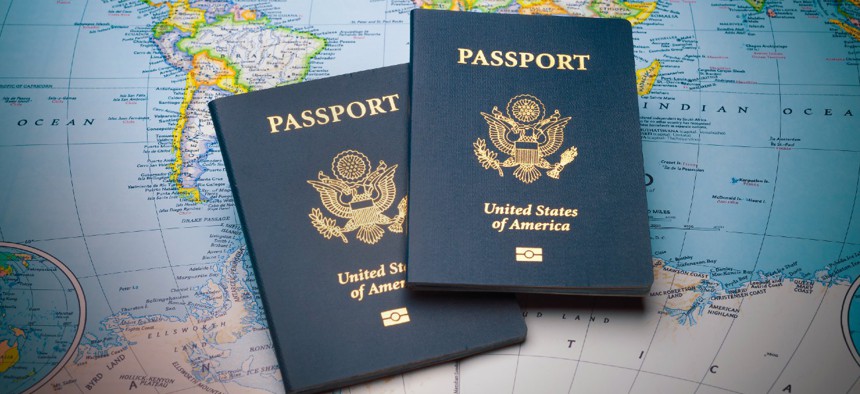
Maudib / iStock.com
State Dept. Promises 'Surge' Staffing to Confront Unprecedented Passport Backlog and Wait Times
Passport specialist workforce has yet to catch up to pre-pandemic levels, which were already well short of full staffing.
The State Department is struggling to deal with a surge in demand for passports as widespread COVID-19 vaccinations have renewed Americans’ appetite for international travel, leading to unprecedented wait times and backlogs.
State is “surging staff” to tackle the crisis, Rachel Arndt, the deputy assistant secretary for passport services in the department’s Bureau of Consular Affairs, said on Wednesday. But she still urged would-be travelers to rethink their plans if they still need a passport for this summer. The workforce strategy includes bringing employees who had been sent home due to the pandemic back to the office, upping contracted workers and hiring new staff. In the meantime, State is expanding overtime at all of its passport offices.
As of this week, State is bringing back all of its passport specialists in 17 cities across the country and expects approval to do so in five more soon. Arndt noted employees must be present in the office to process passports due to privacy concerns, printing equipment and other factors. About 150 employees will return to their offices this summer.
The passport backlog currently sits between 1.5 million and 2 million applications, Arndt said. Passport services is also experiencing unprecedented call volumes, leading State to bring back employees where it can and augment contracted call centers.
State has struggled with backlogs for years. From 2017 to 2019, the department saw an 86% increase in unprocessed passport applications. That coincided with a 14% reduction in staffing of the passport specialists who process and approve the documents. The average expected wait time for routine, non-expedited passports is now 18 weeks, up from four-to-six weeks just four years ago.
The Bureau of Consular Affairs told the State inspector general in 2019 its passport agencies were “critically understaffed at a time when passport issuance increased to an all-time high.” Due to a 16-month hiring freeze at the department instituted shortly after President Trump took office, the bureau turned to “methods that were either more expensive than hiring regular staff or that degraded long-term planning, training and staff development,” the IG said.
In 2017 when passport applications started to spike, State implemented a number of “resiliency” initiatives to help workers deal with the added strain, including management meet-and-greets and casual dress days. Officials also deployed “Passport Pete,” a stuffed porcupine mascot, to regional offices for photo opportunities and activities. Those efforts failed to reverse its workforce trend.
While the staffing levels dropped, demand for passports climbed to all-time highs. Prior to the pandemic, there were 137.5 million passports in circulation, an increase of nearly 100% over a decade prior.
“We are looking at surging back to pre-pandemic staffing levels and additional staff for both government and contractor staff,” Arndt said. She added that because hiring “takes time,” State will rely on overtime surges. The department also instituted mandatory overtime in 2017 through 2019.
State’s briefing came just two days after bipartisan outcry over the backlogs Americans are currently facing to receive new passports. Reps. Gregory Meeks, D-N.Y., chairman of the House Foreign Affairs Committee, and Michael McCaul, R-Texas, the panel's ranking member, said in a letter to State Secretary Antony Blinken they had “significant concern” over the passport wait times and called for the department to prioritize reducing them. The surging demand for passports requires State to develop or reimplement strategies to reduce backlogs, they said. They called the safety of the department's workforce “paramount," but noted more employees can now safely return to work.
Americans can pay an extra $60 for expedited passport processing, but even that option is currently taking 12 weeks. Arndt warned that anyone applying for a passport now will not receive it until “well into the fall.” State is seeking to expand passport appointment options for last-minute processing, but that availability remains “extremely limited.”
“The pandemic’s disruption continues to have ripple effects on all aspects of the passport process,” Arndt said. “U.S. citizens who wish to travel overseas this summer and do not currently have a passport may want to make alternate plans.”







